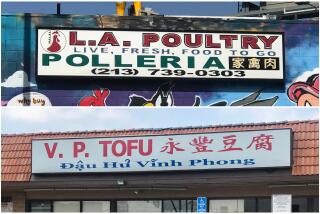Prejudice Message Hits Home : Race relations: L.A. blacks and Koreans gather to discuss a Philadelphia film about stereotypes and tensions.
- Share via
In a meeting hall at a church in South Los Angeles, an audience divided between African- and Korean-Americans sat engrossed by a video entitled, “I’m not prejudiced . . . But . . . “ The movie, taped in Philadelphia, showed people of different ethnic backgrounds airing racial stereotypes and prejudices involving the way Korean-owned businesses operate in the city’s primarily black neighborhoods.
Many of the viewers, who numbered about 60, shifted about uncomfortably. Later, they talked about how the Philadelphia commentary on racial tensions hit home.
“We’ve learned quite a bit . . . but I feel we have a very long way to go,” Ward Wesley, organizer of a community group in South Los Angeles, said after viewing the film. Then, drawing parallels between the Philadelphia experience and tensions that exist between Koreans and blacks in Los Angeles, Ward said: “I feel we are sitting on a keg of dynamite. “
The film was shown Tuesday at Temple Church during the first of a series of seminars sponsored jointly by the Federal Mediation and Conciliation Service and the Los Angeles Human Relations Commission.
“The seminars are for those who understand that the community is changing,” said Avis Ridley-Thomas, coordinator of the Dispute Resolution Center, which is run by the city attorney’s office. “They are the ones who realistically see that changes are going to bring about conflicts, and that those conflicts can turn violent.”
There are more than 300,000 Korean-Americans living in Los Angeles County. More than 800 of them own liquor and convenience stores within the city limits, according to I.S. Kim, spokesman for the Southern California Korean Grocers and Liquor Retailers. Most of those outlets are located in the predominantly black and Latino neighborhoods in the southern part of the city.
In South Los Angeles during the early 1980s, tensions escalated as blacks began to see the Korean-owned businesses flourishing in their neighborhoods. Some residents complained that the owners took but gave nothing back to the communities that supported them. Then, during a monthlong period in the spring of 1986, four Korean merchants were killed by blacks during robberies.
Police were quick to dispel the notion that the attacks were racially motivated, explaining that the murders reflected more the growing presence of the Korean merchants in the city’s worst crime areas.
County and city officials responded by appointing citizens to an advisory council called the Black-Korean Alliance.
While the group stands as a symbol of dialogue between the two communities, officials acknowledge that the alliance has had a limited effect on the day-to-day problems which continue to divide the groups.
About 35 blacks and a dozen Asians were among the 60 who attended Tuesday’s seminar. Some participants were disappointed, however, that more Koreans did not show up. “I don’t see enough Koreans in the audience to make me feel that the Korean community is concerned,” Wesley said.
Some Korean participants agreed, but noted that language difficulties and cultural factors often limit their participation in public gatherings.
More to Read
Sign up for Essential California
The most important California stories and recommendations in your inbox every morning.
You may occasionally receive promotional content from the Los Angeles Times.












